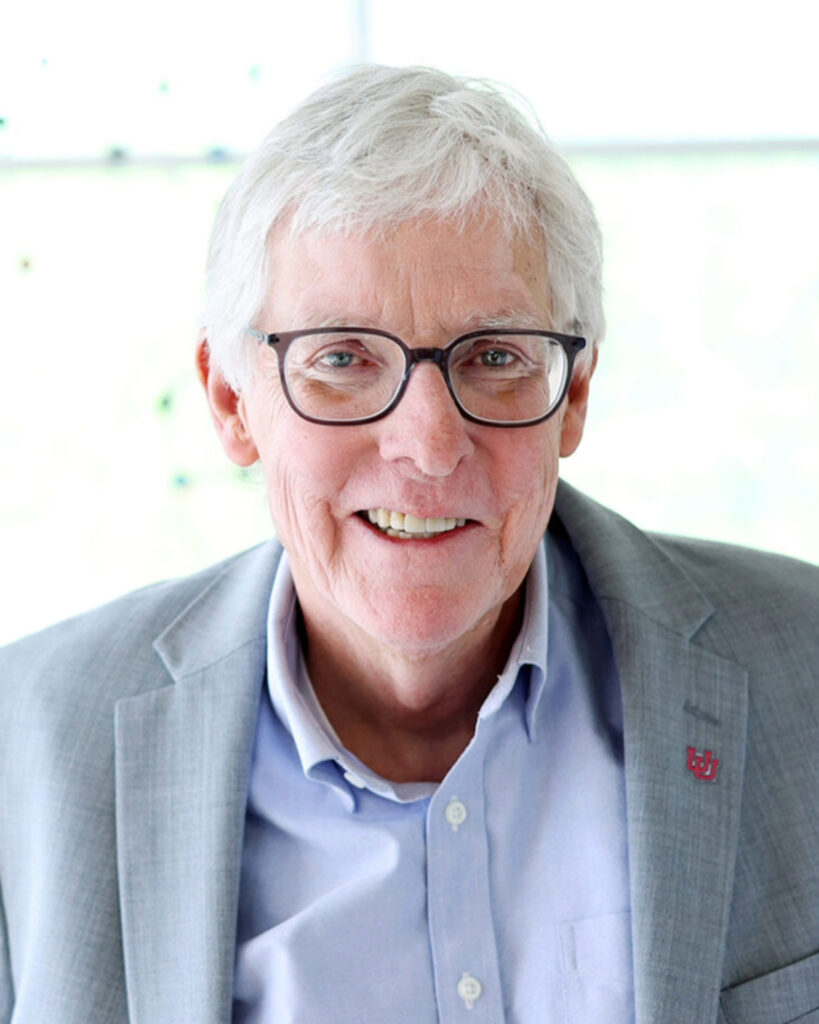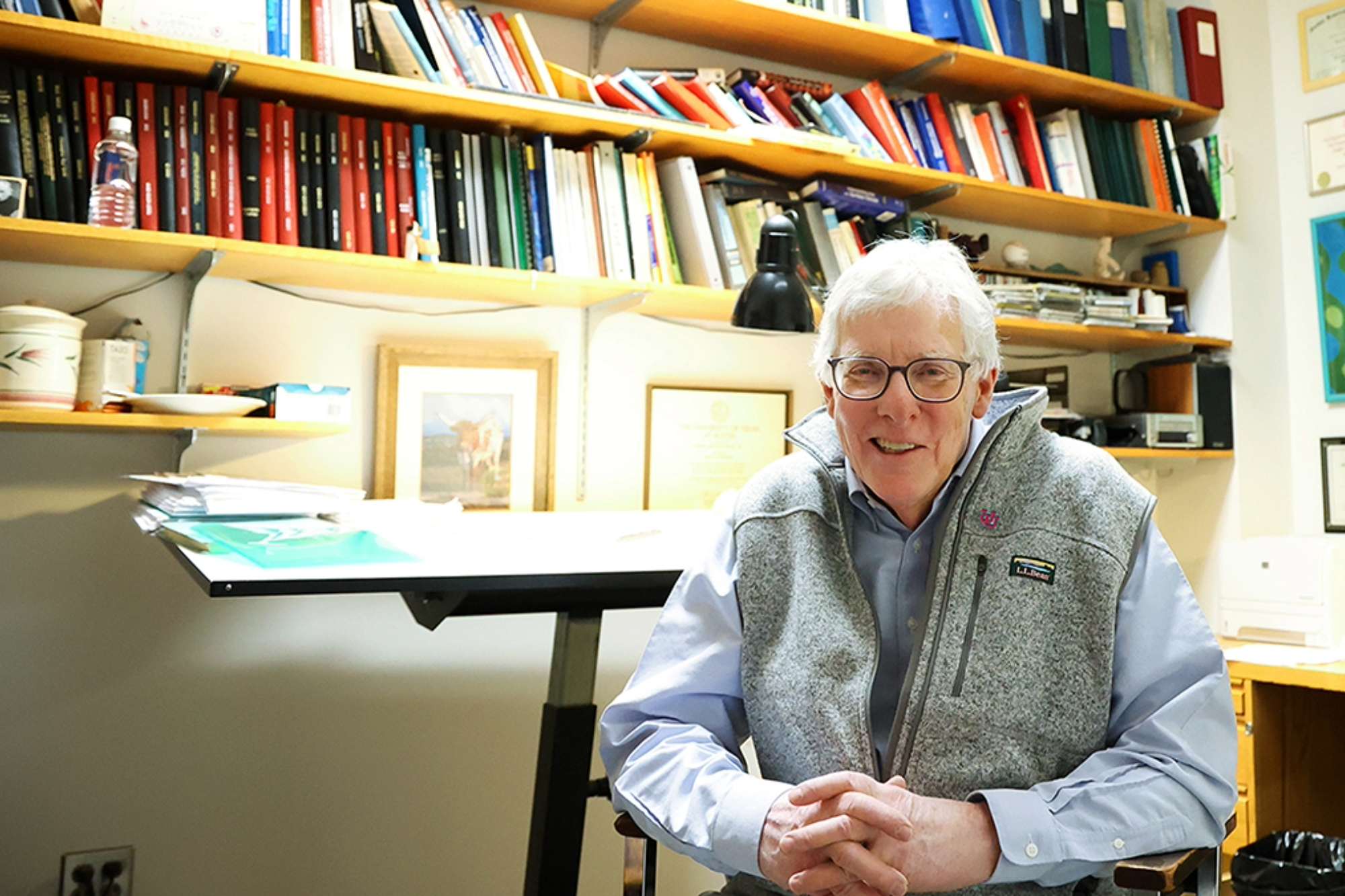2025 Rosenblatt Prize, ChemisT Henry White
May 2, 2025
Above: Henry White
Henry S. White, a world-renowned leader in the field of electrochemistry and distinguished professor chemistry, has been named the 2025 recipient of the University of Utah’s Rosenblatt Prize for Excellence.
A former dean of the College of Science and chairman of the Department of Chemistry, White has demonstrated a deep commitment to student success and is credited with transforming general chemistry education at the U, all the while shepherding the college’s physical expansion and producing world-class basic research that has led to innovations in drug delivery, biosensing and nanotechnology.
“Professor White has demonstrated a deep commitment to student success and is credited with transforming general chemistry education at the U, all the while shepherding the college’s physical expansion and producing basic research that has led to innovations in drug delivery, biosensing and nanotechnology,” said Taylor Randall, University of Utah president. “His leadership as dean and chair have been transformative for the College of Science and Department Chemistry, advancing their world-class research reputations, expanding their educational mission and reimagining philanthropic giving.”
The Rosenblatt Prize is the University of Utah’s highest faculty accolade and is presented annually to a faculty member who transcends ordinary teaching, research and administrative contributions. A group of distinguished faculty members on the Rosenblatt Prize Committee recommends esteemed colleagues for consideration and the university’s president makes the final selection.
About Henry White

Henry White
A leading figure in electrochemistry, White is best known for exploring how electrical processes behave at incredibly small (nanoscale) dimensions, according to distinguished professor of chemistry Cynthia Burrows. His work has shed light on how electric fields at surfaces affect the behavior of molecules attached to those surfaces, discoveries that are important for many devices from sensors to batteries.
“Henry excels in every category of our profession, as an educator and a scholar, and as a leader and colleague,” wrote Burrows, herself the 2019 Rosenblatt laureate, in her letter of nomination. “In his 32 years at the U, he has grown a vibrant research program in experimental and theoretical electrochemistry that has impacted diverse areas in biological, physical, and materials chemistry.”
White helped develop a fundamental theory of how molecules move and interact with electric fields near tiny electrodes, known as ultramicroelectrodes. These insights have practical uses in chemical detection and nanotechnology. One of the most exciting innovations from his lab is a patented method to analyze single DNA molecules using protein-based channels placed in glass nanopore membranes, essentially building a microscopic tool for studying genetic material at the molecular level.
“His group has made major contributions to many other areas of electrochemistry that include the application of magnetic fields in electrochemistry, unraveling the mechanism of electro-osmotic transport of drugs through human skin, breakdown of nanometer thick oxide films in corrosive environments, and the characterization of gas ‘nanobubbles,’” Burrows wrote.
White completed his doctorate in 1983 at the University of Texas and worked for nearly a decade at the University of Minnesota as a professor of chemical engineering and materials science. He joined the U’s chemistry faculty in 1993, serving as department chair from 2007 to 2013 and as dean of the College of Science from 2014 to 2019.
“The five years of Henry’s leadership as dean were a transformative period for the College,” wrote Peter Trapa, vice provost and senior dean of the Colleges and Schools of Liberal Arts and Sciences, in a letter of support for White’s nomination. “During this time, the College advanced its world-class research reputation; significantly expanded its educational mission; completely reimagined its fundraising efforts; and positioned itself to grow and sustain these advances for many years to come.”
White is credited with launching the college’s Science Research Initiative, which provides research opportunities to undergraduates and has since grown to 500 students. As department chair, White implemented major changes in the general chemistry program, requiring that only the top educators teach first-year undergraduate courses.
White himself taught general chemistry many times over the course of his U tenure. More than 40 graduate students have been mentored by White, who also supervised more than 60 research projects by undergraduates in chemistry, materials science, and chemical engineering.
His research, which touches every corner of electrochemistry, has been funded by both industry and a wide range of federal agencies, including Office of Naval Research, the Defense Advanced Research Project Agency, the National Institutes of Health and the National Science Foundation.
Electrochemists study the chemical transformations that occur when electrons are added to molecules in solution, producing results that are advancing energy production and storage. During White’s tenure, the field has gone from relative obscurity to prominence, especially for emerging energy technologies, according to George Whitesides, a university research professor of chemistry at Harvard.
“Even though there is enormous interest in the subject now, very few people really understand it, or the elementary processes it involves. Henry is one of the few who does. He has the true expert’s intuition about the processes that can occur, and the ones that don’t,” Whitesides wrote. “His skill in the science is enormously useful in guiding others who are primarily developing technology or extending applications, and he has assumed the role of arbiter of the “final word” in electrochemical arguments.”
Every major prize available to electrochemists has landed on White, most recently the 2015 Allen J. Bard Award of the Electrochemical Society, for which he was the inaugural recipient. In 2019, the U named him the John A. Widstoe Presidential Endowed Chair of Chemistry, but he later declined to renew the appointment so that it could be offered to a young rising star in the Department of Chemistry.
White helped raise millions in private donations to fund new endowed chairs and construct the Thatcher Building for Biological and Biophysical Chemistry and the Crocker Science Center, both completed under his watch. His initiatives helped diversify the chemistry faculty.
“The accomplishments described above are lasting contributions that will impact the College for generations and are testament to Henry’s exceptional ability as an administrator,” Trapa wrote. “In fact, it is fair to say that he probably did more to advance the dual missions of research and education than anyone who came before him in the history of the College.”
by Brian Maffly
this story originally appeared in @ The U.
